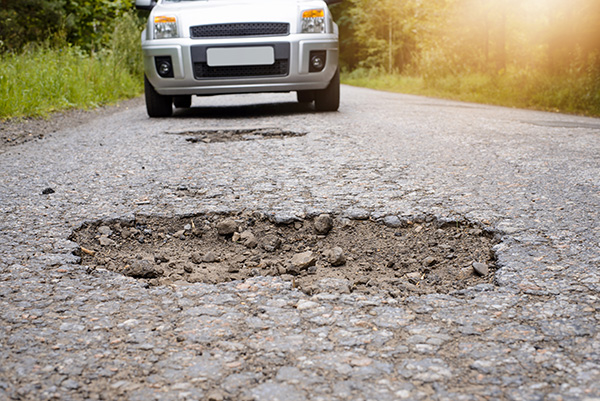
Potholes are the hidden enemy of drivers everywhere. You may not even notice them until it’s too late, but that sudden thud can cause more damage to your car than you might realize. While they might seem like just another part of everyday driving, potholes have the potential to cause serious harm to various components of your vehicle, from your tires to your suspension and even your alignment. So, what exactly can that nasty pothole do to your car?
Tires and Wheels
Your tires and wheels are the first parts of your car that absorb the impact when you hit a pothole. The impact can lead to immediate damage, such as tire punctures or sidewall bulges, if the impact is severe enough. These issues may not seem like a big deal at first, but they can lead to dangerous blowouts while driving, especially at higher speeds.
Wheels are also at risk. A hard hit from a pothole can bend or crack your rims, leading to air leaks or even a flat tire. You might notice a vibration while driving or uneven wear on your tires if the wheels have been damaged. This type of damage often goes unnoticed until it causes a bigger problem, so it's important to keep an eye out for any unusual signs after hitting a pothole.
Suspension System
Your car's suspension system is designed to absorb shock and keep your vehicle stable, but potholes can put it to the test. If you hit a pothole, your suspension has to work extra hard to cushion the blow. Over time, repeated encounters with potholes can wear down suspension components such as your shocks, struts, and control arms.
Signs of suspension damage include your car feeling “bouncy” when driving over bumps or dips or hearing clunking noises from underneath the vehicle. If you experience these symptoms, it might be time to have your suspension inspected. Damaged suspension components not only make your ride uncomfortable but can also make your car harder to control, putting your safety at risk.
Alignment Issues
Another common issue caused by potholes is misalignment. Your car’s alignment ensures that your wheels are positioned correctly and your car drives in a straight line. When you hit a pothole, especially at higher speeds, the force can cause your wheels to become misaligned. This leads to uneven tire wear, which can shorten the life of your tires and make your car pull to one side.
Driving with poor alignment can be frustrating and even dangerous, as it affects your ability to steer the car accurately. If you notice your car pulling in one direction or your steering wheel feels off-center, it’s likely that a pothole has affected your alignment.
Exhaust System
The underside of your car isn’t immune to pothole damage either. In some cases, a deep pothole can cause your exhaust system to scrape the ground or even get knocked loose. The exhaust system is located underneath your car, so it’s particularly vulnerable to damage from rough roads.
A damaged exhaust system can lead to leaks, decreased fuel efficiency, or loud driving noises. If you hear a rattling sound after hitting a pothole, it might be a sign that your exhaust system has taken a hit and needs inspection.
Undercarriage and Frame Damage
The undercarriage is often equipped to handle more rough terrain for larger vehicles like trucks and SUVs, but potholes can still take a toll. The undercarriage is the bottom part of your vehicle that protects various components from road debris. Deep potholes can cause scraping or damage to the protective shields, leading to issues with the transmission or even fuel lines if the damage is severe enough.
In some cases, hitting a particularly deep or sharp pothole can even bend your vehicle's frame. Frame damage can be costly to repair and may lead to further complications down the road, such as misalignment or uneven weight distribution.
How to Minimize Pothole Damage
While it’s almost impossible to avoid potholes entirely, there are steps you can take to minimize the damage they cause to your car. The first step is to keep your tires properly inflated—this helps absorb some of the shock when you hit a pothole. Driving at lower speeds, especially in areas where potholes are common, can also reduce the impact and prevent more severe damage to your suspension and tires.
Another good practice is to regularly inspect your car after a rough ride. If you notice any signs of damage, such as steering issues, vibrations, or unusual tire wear, it's a good idea to get your vehicle checked out by a professional.
Concerned about pothole damage to your vehicle? Schedule an inspection at Fox Run Auto. Our skilled technicians will thoroughly check your tires, suspension, and alignment to ensure your car stays safe and road-ready.